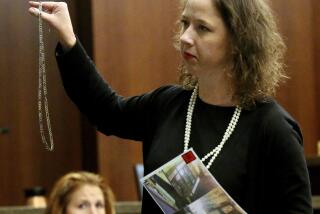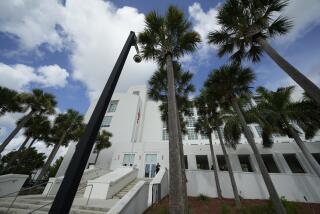Prosecutors Still Wrestling With Decision on Cowlings : Law: Whether to charge O.J. Simpson’s friend in the chase also has serious impact on murder defendant’s trial.
- Share via
Caught between competing interests and faced with daunting legal complexities, prosecutors for a third straight day put off a decision Thursday about whether to charge Al Cowlings with a crime for his role in O.J. Simpson’s bizarre trek on Southern California freeways last month.
Even though Cowlings, a lifelong friend and former teammate of Simpson’s, is expected in court today, district attorney’s officials said they plan to ask for more time to investigate the possible case against him.
That no decision has been made reflects the pressures behind the scenes as prosecutors weigh a choice that may have significant implications not only for Cowlings, but for Simpson as well.
On one side are police, eager to see Cowlings prosecuted for his role in the chase, irritated by his behavior at the scene of Simpson’s surrender, and determined to see that actions they consider criminal are treated like a crime. On the other side are prosecutors, seeking to show resolve in dealing with a person booked for aiding a fugitive, yet facing a potentially difficult task convicting Cowlings, and who are said to be concerned that prosecuting him might complicate their double murder case against Simpson.
For one thing, a Cowlings prosecution could stymie any effort by government lawyers to gain access to Simpson’s friend--who can legally refuse to testify in any trial as long as he is a potential criminal defendant. Trying Cowlings also would take time and energy from prosecutors racing to meet a speedy trial deadline in the Simpson case, and could give Simpson’s defense lawyers access to discovery material and testimony that they might not otherwise be able to get in preparation for the Simpson trial, legal experts said.
Given all of that, experienced lawyers generally doubt that Cowlings will be charged. Even some police who support the idea are skeptical that the district attorney’s office will choose to prosecute.
But the stakes for the district attorney were raised this week with the disclosure that a passport and nearly $10,000 were found in the Ford Bronco that Cowlings drove on the afternoon of the fateful, low-speed police chase through Orange County and Los Angeles. Simpson was riding in the back of that car, cradling a loaded gun.
*
The passport and money could suggest that Simpson’s motive was not to commit suicide or to visit his ex-wife’s grave, but rather to flee. And if that were the true motive, it could suggest that Cowlings was aiding a fugitive--as police alleged when he was arrested--rather than trying to keep his lifelong friend from committing suicide.
Cowlings was arrested June 17 after the nationally-televised pursuit ended in Simpson’s Brentwood driveway. Although officers said he interfered with their efforts to negotiate with Simpson, they also noted that he came to their aid at one point, delivering a new cellular phone to Simpson when the one he was using stopped working. After Simpson surrendered, Cowlings was booked on suspicion of aiding a fugitive and released after posting a $250,000 bond.
Donald Re, the highly regarded defense attorney representing Cowlings, said his client never meant to assist Simpson’s flight and that even if the passport and money were recovered, Cowlings had no knowledge of them. Re added that he has been in contact with prosecutors but that they have given him little hint about which way they are leaning as they weigh the evidence against his client.
Legal experts outside the district attorney’s office say a number of issues are likely to influence the decision whether to prosecute. In particular, they said, prosecutors have to be concerned about avoiding any misstep in the Cowlings case that could undermine their principal objective, to convict Simpson of the murders of his ex-wife, Nicole Brown Simpson, and her friend Ronald Lyle Goldman.
One consideration in the Cowlings case, they said, is the issue of Cowlings’ rights under the 5th Amendment, which protects citizens from being compelled to give testimony against themselves.
As a potential defendant, Cowlings has the right to remain silent and cannot be forced to testify, either at his trial or at Simpson’s. But few people have greater knowledge of Simpson and virtually no one other than Cowlings knows the full story of what he and Simpson did during the six hours that they were unaccounted for on June 17, the day Simpson was scheduled to surrender to authorities.
The trouble for prosecutors is that if they file charges against Cowlings, he can exercise his right against self-incrimination to refuse to discuss with government lawyers the events of that day. Only by dropping the charges or by granting him immunity might prosecutors get access to Cowlings. The trade-off: They would lose the chance to prosecute him for any role he might have had in harboring or aiding a fugitive.
“If the prosecution wants to force Cowlings to testify with regard to that afternoon and evening, then they would have to provide legal assurance that he will not be prosecuted,” said Erwin Chemerinsky, a USC law professor. “Otherwise, he has the right to invoke the 5th Amendment.”
John Wiley, a UCLA law professor and former federal prosecutor, agreed and said prosecutors would almost certainly weigh that decision carefully.
“The main prosecution interest has got to be to talk to him,” Wiley said. “They need to get him on the record, but they can’t do that as long as he’s a defendant.”
There is yet another consideration. If prosecutors granted Cowlings immunity, he could still refuse to talk to them before testifying. If called to the witness stand, he would have no right to refuse, but prosecutors would have no advance idea of what he might say, and they would almost certainly be reluctant to put Simpson’s close friend on the stand without some sense of the testimony he would give.
All those considerations have made the decision about whether to prosecute a complicated one, sources said.
As they weighed their decision in the Cowlings case, officials in the district attorney’s office also sought to fend off yet another flare-up at the margins of the case.
Wednesday night, KCBS-TV broadcast footage of Deputy Dist. Atty. Marcia Clark at Simpson’s home on the morning that police received a warrant to search the property. The station reported that Clark was pictured before the service of the warrant and suggested that her presence could raise problems for the prosecution--specifically because it might allow defense attorneys to call her as a witness in their efforts to have the search warrant invalidated.
According to the station, the videotape of Clark at the scene was transmitted to the station at 10:28 a.m. on the day of the search--June 13. The search warrant was signed by a judge at 10:45 a.m.
Legal experts generally downplayed the significance of Clark’s presence at the scene, saying that even if she were there before the service of the search warrant, that would not necessarily be a problem. Clark could have been there to answer any legal questions by police officers or even to safeguard against any improper searches while awaiting the delivery of the warrant, lawyers said.
“The fact that she’s there on the premises is not a problem,” said Harland W. Braun, a prominent Los Angeles defense attorney and former local prosecutor. “In fact, you could make the argument that it’s good to have her out there supervising.”
Leo Terrell, a local civil rights lawyer, said Simpson’s attorneys could make an issue of Clark’s presence if it turns out that she was there before the issuance of the search warrant. “If she was there before the warrant was issued and she participated in gathering of illegally obtained evidence, there’s a question about her standing in the case,” he said.
The district attorney’s office, in a highly unusual response to a media report about the Simpson case, released a brief written statement saying the television station’s account was inaccurate.
“Ms. Clark arrived at the location following the delivery of the warrant to give legal advice on the execution of the warrant, as is often done by lawyers in our office,” the statement read. “The district attorney’s office will have no further statement on this matter.”
Bob Jordan, news director for KCBS, said the station stands by its report. Jordan reiterated that the time stamp on the videotape confirms that it was transmitted at 10:28 a.m.
“The technician who took in the feed also wrote on the tape box the time he sent it in,” said Jordan. “That was 10:26. He was a little off, but it supports us. Our time stamp is accurate.”
More to Read
Sign up for Essential California
The most important California stories and recommendations in your inbox every morning.
You may occasionally receive promotional content from the Los Angeles Times.














